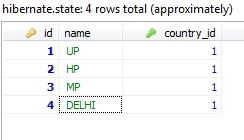Example of @OrderBy in Hibernate
May 22, 2013
@OrderBy orders the column values and put into the list as ordered list data. By Default @OrderBy orders the element in ascending order. We need to define property name on the basis of which values will be ordered. In our example, a country has many states. Country and States are associated by @OneToMany. We are ordering states on the basis of state name. Syntax is:
@OrderBy("property name")
Country.java
package com.concretepage.persistence;
import java.io.Serializable;
import java.util.List;
import javax.persistence.CascadeType;
import javax.persistence.Column;
import javax.persistence.Entity;
import javax.persistence.Id;
import javax.persistence.JoinColumn;
import javax.persistence.OneToMany;
import javax.persistence.OrderBy;
@Entity
public class Country implements Serializable {
private static final long serialVersionUID = 1L;
@Id
@Column(name="id")
private int id;
@Column(name="name")
private String name;
@OneToMany(cascade=CascadeType.ALL)
@JoinColumn(name="country_id")
@OrderBy("name")
private List<State> states;
public Country(int id,String name,List<State> states){
this.id=id;
this.name=name;
this.states=states;
}
public Country(){
}
public int getId() {
return id;
}
public void setId(int id) {
this.id = id;
}
public String getName() {
return name;
}
public void setName(String name) {
this.name = name;
}
public List<State> getStates() {
return states;
}
public void setStates(List<State> states) {
this.states = states;
}
}
package com.concretepage.persistence;
import javax.persistence.Column;
import javax.persistence.Entity;
import javax.persistence.Id;
import javax.persistence.Table;
@Entity
@Table(name = "state")
public class State {
@Id
@Column(name = "id")
private int id;
@Column(name = "name")
private String name;
public State(int id,int countryId,String name){
this.id=id;
this.name=name;
}
public State(){}
public String getName() {
return name;
}
public void setName(String name) {
this.name = name;
}
public int getId() {
return id;
}
public void setId(int id) {
this.id = id;
}
}
package com.concretepage.util;
import java.util.List;
import java.util.Properties;
import org.hibernate.HibernateException;
import org.hibernate.Session;
import org.hibernate.SessionFactory;
import org.hibernate.cfg.AnnotationConfiguration;
import com.concretepage.persistence.Country;
import com.concretepage.persistence.State;
public class HibernateUtil {
private static final SessionFactory concreteSessionFactory;
static {
try {
Properties prop= new Properties();
prop.setProperty("hibernate.connection.url", "jdbc:mysql://localhost:3306/hibernate");
prop.setProperty("hibernate.connection.username", "root");
prop.setProperty("hibernate.connection.password", "");
prop.setProperty("hibernate.hbm2ddl.auto", "update");
prop.setProperty("dialect", "org.hibernate.dialect.MySQLDialect");
concreteSessionFactory = new AnnotationConfiguration()
.addPackage("com.concretepage.persistence")
.addProperties(prop)
.addAnnotatedClass(Country.class)
.addAnnotatedClass(State.class)
.buildSessionFactory();
} catch (Throwable ex) {
throw new ExceptionInInitializerError(ex);
}
}
public static Session getSession()
throws HibernateException {
return concreteSessionFactory.openSession();
}
public static void main(String... args){
Session session=getSession();
session.beginTransaction();
Country c=(Country)session.get(Country.class, new Integer(1));
List<State> states = c.getStates();
for(State s: states){
System.out.println(s.getName());
}
session.close();
}
}

and output as follows
DELHI HP MP UP


